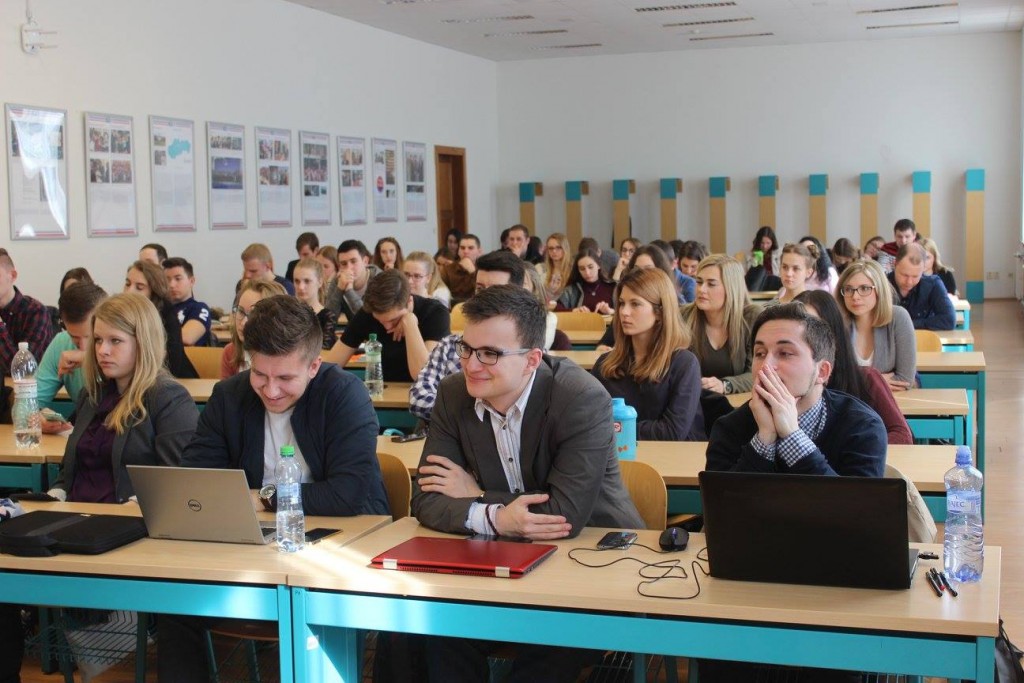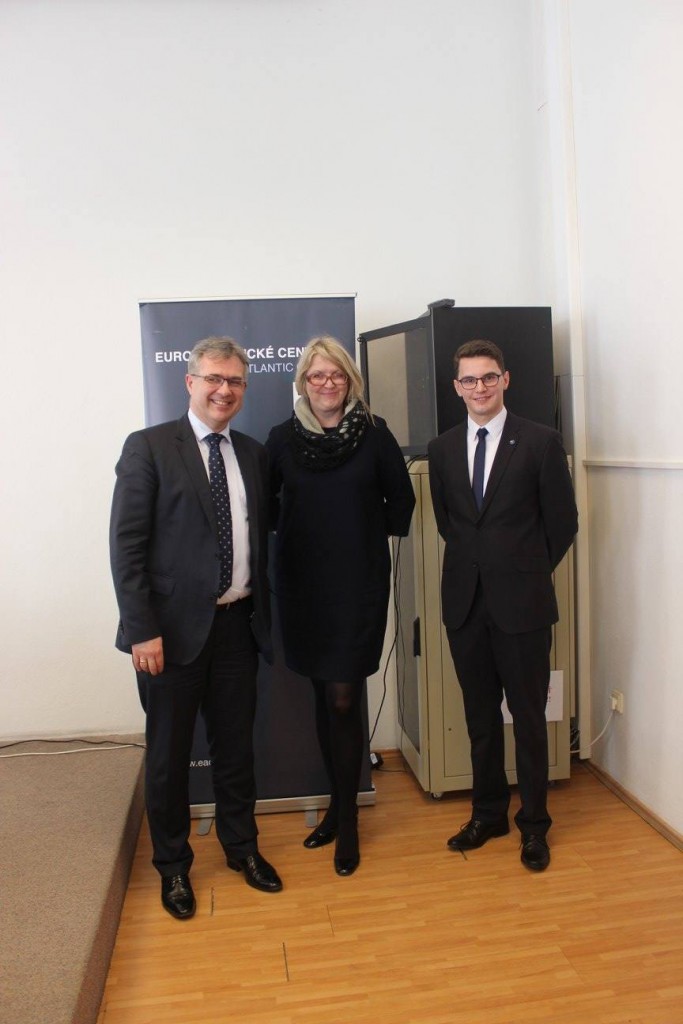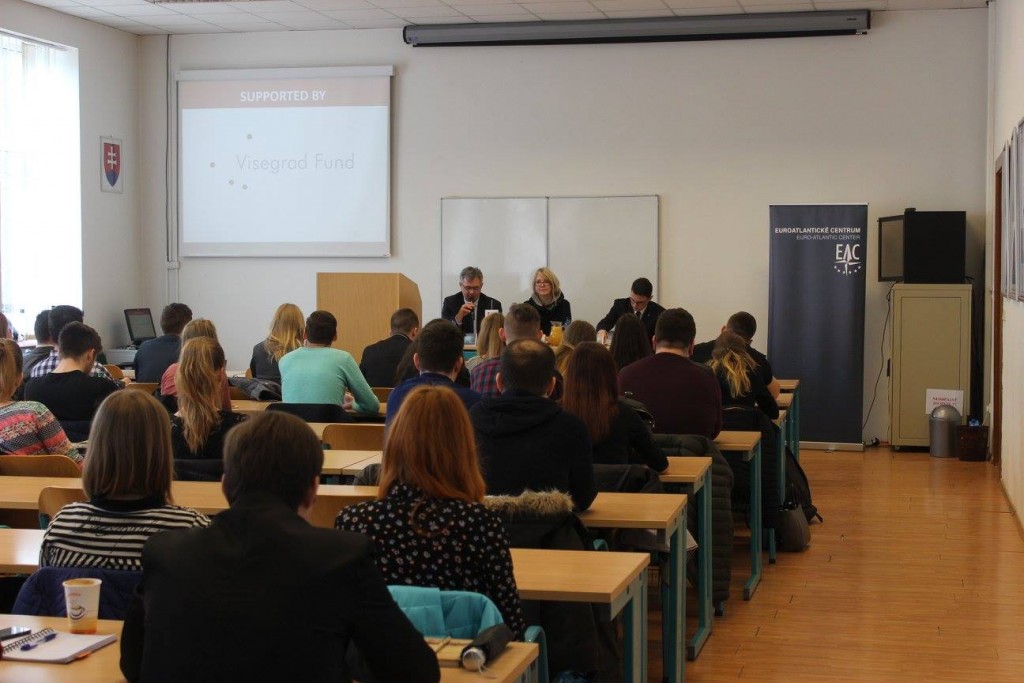[:en]
On march 6th 2017, the Euro-Atlantic Center organized a discussion named „Digital Visegrad and E-commerce- trends and perspective“, which took place at the Faculty of Political Science and International Relations of the Matej Bel University in Banská Bystrica. This event was part of the international project Young Leaders Forum: Beyond Polish and Ahead of Hungarian V4 Presidency and supported by the International Visegrad Fund. Two invited guests were: Ms Beata Jaczewska, an Executive director of the International Visegrad Fund and Mr. Piotr Samerek, Minister Counsellor at the Embassy of Poland to the Slovak Republic.
At first, Mr. Samerek presented the statement of Polish presidency of the V4 on digital Visegrad and e-commerce trends. Mr. Samerek told us, that the issue of digital Visegrad and digital Europe is a little bit overshadowed by political topics. The issue of digitalisation is put on a high level by Polish presidency of the V4 because its problem is getting more and more important for Poland and for the whole Visegrad group. Polish presidency has created a program where there are included some areas of cooperation concerning a definiton what is digital market and digitalisation. The first point of Polish program is about cyber security. The second issue is concerned with smart management and standardisation. The third area is about e-commerce, focused on rights of consumers. E-commerce is becoming more popular and is influencing our lives. Further area is oriented to prepare people for evolution of an e-agenda, for digitalization and for the access to e-commerce. Another area is dealing with innovations, how digital sector is functioning, how people are active in creating new activities, ideas and startups in this area. We have to realize, that it is very important to unite potential of the V4 and the fact is that common declaration to work on common digital market is due to be signed.
In march 2017, the innovators summit will take place in Warsaw to increase mutual cooperation and innovation in digital affairs, mainly among young potential innovators. The issue of digitalization is getting more and more popular and important for the policies of V4. It ´s also important because of the growth of an economy of the EU and V4 countries.
Afterwards, Ms Beata Jaczewska reacted and continued to talk about the importance of enlarging digital market. Ms Jaczewska claimed that today is everything in one device, like wallet, navigation, calendar and so on, so we can see digitalization is really important process and it would never be stopped, same as what has happened with industrial revolution. Nevertheless, it is a complex process, driven mainly bottom –up, and that is why issues like geo-blocking or personal data protection on internet, should never be forgotten in this discussion.. As we know, today there are a lot of social networks like Facebook, Instagram, Snapchat, Twitter, Linkedln etc., and people tend to upload there lots of their personal data. As Ms Jaczewska said the internet never forgets anything, each picture, each information, everything stays there forever and it can be used with bad intention.
After the introduction speech of our guests, students prepared some questions for them which were also posted by online platform sli.do. First question was how the International Visegrad Fund (IVF) supports digital agenda. Ms Jaczewska answered that the support is mostly through cooperation of young people. As long as ideas of people are good for the region, they are happy to support them. The IVF´s aim is to support and to sponsor young people to make their ideas with added value.
Followingly, Mr Samerek reacted on the poll, which has been created. The question was, „What is the biggest obstacle for the development of digital economy in the Visegrad region?“ 43% respondents answered that it´s because of political unwillingness, then 36% because of the internet and electronic illiteracy. Mr. Samerek mentioned that according to his opinion it´s because of lack of will of big companies which are active in the V4 region. For instance, in Poland and Czech Republic, there is different price for 1GB internet and it´s fault of the company and its policy. So how to make it better? Solutions should be to persuade these companies that new technologies will bring benefits, but in this moment this process has just begun.
Another question was if V4 can influence the development of the common European digital market and e-commerce. If yes, to what extent? Ms Jaczewska reacted that it is about free trade inthe EU and it´s precisely what the V4 Governments are trying to do. Central Europe’s economy is still less developed in comparison to western countries and the discussion on Digital Single Market is a discussion on EU’s competitiveness (seen internally and globally). Officials in Brussels or national governments are struggling with companies that are kind of „supranational“ but there are also many smaller companies involved, not to mention customers and thus it´s important to have allies during those negotiations, and Central Europe can achieve more by cooperation. V4 countries should hold together to at least have a chance to compete in innovations with bigger and more experienced countries like Germany or France.
 So why is there fight between states and companies? Because digital market offers a space for everybody not only in traditional understanding of commercial relations – it is about human to human relations regarding i.a the exchange of information, respecting each other’s rights like freedom of speech, freedom of beliefs or protection of personal data, but also taking responsibility for using this new public space. Everybody wants to survive in this new digital reality – and this is exactly what is happening – digitalisation brings new reality to the world.
So why is there fight between states and companies? Because digital market offers a space for everybody not only in traditional understanding of commercial relations – it is about human to human relations regarding i.a the exchange of information, respecting each other’s rights like freedom of speech, freedom of beliefs or protection of personal data, but also taking responsibility for using this new public space. Everybody wants to survive in this new digital reality – and this is exactly what is happening – digitalisation brings new reality to the world.
On march 6th 2017, the Euro-Atlantic Center organized a discussion named „Digital Visegrad and E-commerce- trends and perspective“, which took place at the Faculty of Political Science and International Relations of the Matej Bel University in Banská Bystrica. This event was part of the international project Young Leaders Forum: Beyond Polish and Ahead of Hungarian V4 Presidency and supported by the International Visegrad Fund. Two invited guests were: Ms Beata Jaczewska, an Executive director of the International Visegrad Fund and Mr. Piotr Samerek, Minister Counsellor at the Embassy of Poland to the Slovak Republic.
At first, Mr. Samerek presented the statement of Polish presidency of the V4 on digital Visegrad and e-commerce trends. Mr. Samerek told us, that the issue of digital Visegrad and digital Europe is a little bit overshadowed by political topics. The issue of digitalisation is put on a high level by Polish presidency of the V4 because its problem is getting more and more important for Poland and for the whole Visegrad group. Polish presidency has created a program where there are included some areas of cooperation concerning a definiton what is digital market and digitalisation. The first point of Polish program is about cyber security. The second issue is concerned with smart management and standardisation. The third area is about e-commerce, focused on rights of consumers. E-commerce is becoming more popular and is influencing our lives. Further area is oriented to prepare people for evolution of an e-agenda, for digitalization and for the access to e-commerce. Another area is dealing with innovations, how digital sector is functioning, how people are active in creating new activities, ideas and startups in this area. We have to realize, that it is very important to unite potential of the V4 and the fact is that common declaration to work on common digital market is due to be signed.
In march 2017, the innovators summit will take place in Warsaw to increase mutual cooperation and innovation in digital affairs, mainly among young potential innovators. The issue of digitalization is getting more and more popular and important for the policies of V4. It ´s also important because of the growth of an economy of the EU and V4 countries.
Afterwards, Ms Beata Jaczewska reacted and continued to talk about the importance of enlarging digital market. Ms Jaczewska claimed that today is everything in one device, like wallet, navigation, calendar and so on, so we can see digitalization is really important process and it would never be stopped, same as what has happened with industrial revolution. Nevertheless, it is a complex process, driven mainly bottom –up, and that is why issues like geo-blocking or personal data protection on internet, should never be forgotten in this discussion.. As we know, today there are a lot of social networks like Facebook, Instagram, Snapchat, Twitter, Linkedln etc., and people tend to upload there lots of their personal data. As Ms Jaczewska said the internet never forgets anything, each picture, each information, everything stays there forever and it can be used with bad intention.
After the introduction speech of our guests, students prepared some questions for them which were also posted by online platform sli.do. First question was how the International Visegrad Fund (IVF) supports digital agenda. Ms Jaczewska answered that the support is mostly through cooperation of young people. As long as ideas of people are good for the region, they are happy to support them. The IVF´s aim is to support and to sponsor young people to make their ideas with added value.
Followingly, Mr Samerek reacted on the poll, which has been created. The question was, „What is the biggest obstacle for the development of digital economy in the Visegrad region?“ 43% respondents answered that it´s because of political unwillingness, then 36% because of the internet and electronic illiteracy. Mr. Samerek mentioned that according to his opinion it´s because of lack of will of big companies which are active in the V4 region. For instance, in Poland and Czech Republic, there is different price for 1GB internet and it´s fault of the company and its policy. So how to make it better? Solutions should be to persuade these companies that new technologies will bring benefits, but in this moment this process has just begun.
Another question was if V4 can influence the development of the common European digital market and e-commerce. If yes, to what extent? Ms Jaczewska reacted that it is about free trade inthe EU and it´s precisely what the V4 Governments are trying to do. Central Europe’s economy is still less developed in comparison to western countries and the discussion on Digital Single Market is a discussion on EU’s competitiveness (seen internally and globally). Officials in Brussels or national governments are struggling with companies that are kind of „supranational“ but there are also many smaller companies involved, not to mention customers and thus it´s important to have allies during those negotiations, and Central Europe can achieve more by cooperation. V4 countries should hold together to at least have a chance to compete in innovations with bigger and more experienced countries like Germany or France.
 So why is there fight between states and companies? Because digital market offers a space for everybody not only in traditional understanding of commercial relations – it is about human to human relations regarding i.a the exchange of information, respecting each other’s rights like freedom of speech, freedom of beliefs or protection of personal data, but also taking responsibility for using this new public space. Everybody wants to survive in this new digital reality – and this is exactly what is happening – digitalisation brings new reality to the world.
So why is there fight between states and companies? Because digital market offers a space for everybody not only in traditional understanding of commercial relations – it is about human to human relations regarding i.a the exchange of information, respecting each other’s rights like freedom of speech, freedom of beliefs or protection of personal data, but also taking responsibility for using this new public space. Everybody wants to survive in this new digital reality – and this is exactly what is happening – digitalisation brings new reality to the world.

